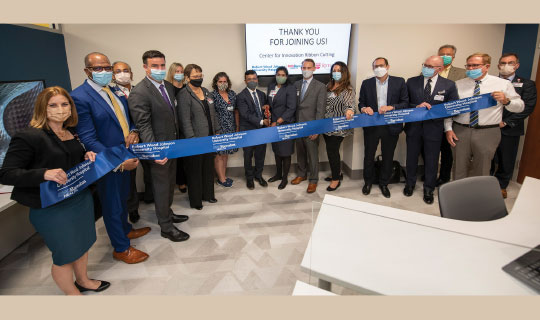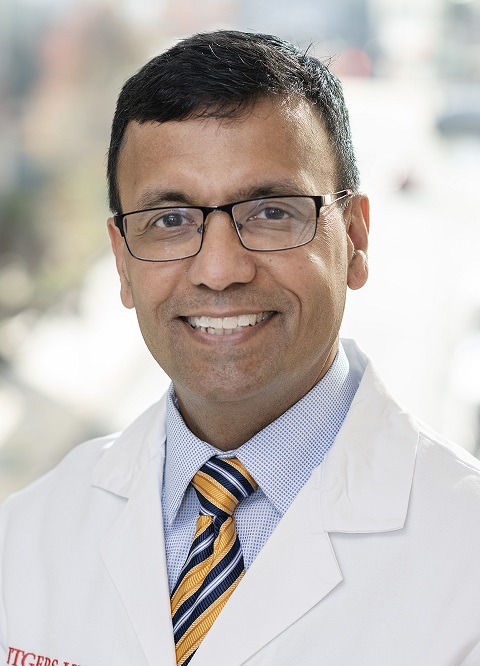
A new center for innovation builds pathways to medical breakthroughs.

“We’re at an inflection point,” says Partho Sengupta, MD, FACC. Healthcare providers know patients have complex needs when fighting cardiovascular disease. At the same time, technology provides new and expanding opportunities to detect, monitor and treat heart problems and related conditions.
Now Robert Wood Johnson University Hospital (RWJUH) and Rutgers Robert Wood Johnson Medical School (Rutgers RWJMS) are seizing the moment with the launch of a new initiative called the Center for Innovation. Located on the main campus of the hospital, the center held its grand opening in September.
The center’s concept and design were led by the Cardiovascular Services team under the direction of Dr. Sengupta, the Henry Rutgers Professor of Cardiology and Chief of the Division of Cardiovascular Disease and Hypertension at Rutgers RWJMS, Chief of Cardiology at RWJUH, and a member of RWJBarnabas Health Medical Group. But the center—a partnership between RWJUH and Rutgers RWJMS made possible via donor funding from the RWJ University Hospital Foundation—is designed for use across all clinical teams and disciplines.
“We’re creating an environment where we can solve real-life problems with technology by bringing together multidisciplinary teams of clinicians, researchers, engineers, industry partners and other stakeholders from the health system and community,” Dr. Sengupta says. “It’s like an incubator: You identify problems, come up with creative solutions, develop pilot projects and—once you assess results—launch innovations into clinical practice.”
It’s hoped that clinical trials of new technologies or novel uses for existing technologies will yield medical breakthroughs that improve preventive care and health outcomes for patients.
Proactive Medicine
A key idea is that healthcare entails more than reacting to clinical problems like heart disease after they become a threat. “Heart attack and heart failure are basically end-of-road stages in conditions that have a long latent period,” Dr. Sengupta says. “How do we discover heart disease and related conditions earlier so heart attacks and heart failure don’t happen in the first place?”
He points not only to high-tech hardware but to digital solutions that use data and artificial intelligence (AI) to provide health forecasts and help steer preventive care.
“We see a whole journey of patient care that incorporates wellness, development of conditions, care in the hospital and disease management back at home,” Dr. Sengupta says. “It’s a continuum in which we can develop techniques using a multitude of variables and digital solutions to constantly monitor progression of disease and predict the need for interventions. So rather than being reactive, we can be proactive.”
The center’s core team for digital transformation is led by Naveena Yanamala, PhD, Director of Artificial Intelligence and Data Science in the Division of Cardiovascular Disease and Hypertension, Rutgers RWJMS, who also sees technology facilitating tailored care to individual patients.
“Medicine is not one-size-fits-all,” Dr. Yanamala says. “People have different lifestyles, racial and ethnic backgrounds and other variations. A condition like atrial fibrillation could be different from one person to the next. We want medicine to move toward four P’s: predictive, preventive, precise and personalized. An effort like the Center for Innovation can actually make this happen by giving us the ability to figure out actionable insights and improve patient care as well as outcomes.”
Care may also improve through enhancements for physicians. For example, AI could help analyze data from an echocardiogram to obtain clinical insights much faster than a doctor alone could. “This could give a physician more time to spend with patients,” Dr. Yanamala says. “There may be many ways to automate processes combining AI and robotic technologies to free physicians’ time or even keep them safer from things such as radiation exposure.”
A Wealth of Ideas
The Cardiovascular Services team already has clinical trials underway. One is evaluating an FDA-approved robotic ultrasound telemedicine system to effectively capture expert-quality cardiac ultrasound images remotely. Another is studying the use of wearable sensors such as armbands that collect health data from patients diagnosed with high blood pressure and/or early-stage heart failure. The information is then used to initiate guideline-directed medical treatment remotely.
Other examples of technologies under research and development include:
- Use of earbuds that both deliver music and provide real-time heart rhythm metrics such as heart rate and heart rate variability
- A medical vest and a wearable wrist band with sensors that a patient can put on to record vital information capable of indicating a heart attack without requiring a blood draw and analysis
- Handheld mobile electrocardiogram (EKG) technology as a replacement for use of a stethoscope
- Glass-free 3D displays and software capable of transforming 2D data from a patient’s echocardiogram into a 3D display that a physician can manipulate by speaking or using hand gestures
The Center for Innovation’s space is itself designed to help researchers and clinicians from different disciplines share ideas and propose creative solutions. Features include open spaces where people can gather and discuss ideas, private and conference areas where people can minimize distractions and even walls painted with colors linked to creative thinking.
“It’s important to create a space and environment that is optimized for creativity, innovative thinking and collaboration,” Dr. Sengupta says. “We’re creating a culture of innovation—a culture of inquiry, inclusiveness and inspiration. For a flagship academic medical program, leading through discovery promotes a sense of joy and purpose that creates the best learning environment in addition to advancing patient care.”
Whoever your heart beats for, our hearts beat for you. To connect with a top cardiovascular specialist at Robert Wood Johnson University Hospital, call 888-724-7123. Learn more about the Center for Innovation, clinical trials and technology development.